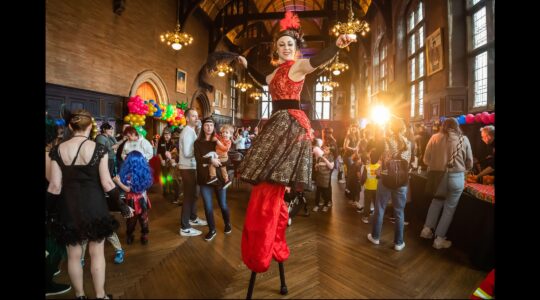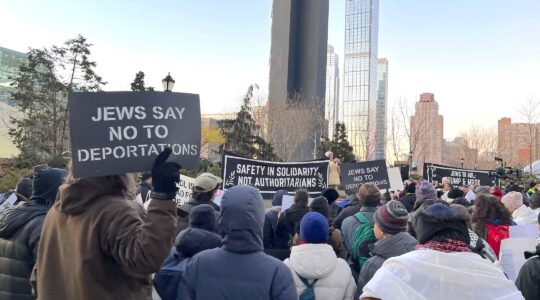Many great authors were famously alcoholic — Fitzgerald and Faulkner come swiftly to mind — and so were other writers of lesser stature. Among these was the vagabond Hebrew poet Naphtali Herz Imber, who was born in Galicia in 1856. He lived for four years in Palestine, wandered (he claimed) as far as Bombay, and spent his final 17 years in America, where he earned a paltry income as a freelance writer for the Anglo-Jewish press, reinvented himself as a purveyor of popular Kabbalah and died at the age of 53. Pretty much everything he ever wrote is forgotten today.
Except for one poem. As he lay on his deathbed on the Lower East Side, he was eulogized in The New York Times, with the headline “The Poet of Zion Suffers Paralysis.” Thousands of Jews flocked to his funeral to honor the great hero. For this boozy bohemian was the man who, in 1886, had published in Jerusalem a nine-stanza Hebrew poem that he titled (in Ashkenazic transliteration) “Tikvoseinu” (“Our Hope”), better known as “Hatikvah,” which became a huge and everlasting hit. In 1888, the first stanza was set to music by one Shmuel Cohen of Rishon Letzion, and was adopted by the young pioneers of the first Zionist settlements in Palestine, and by their Jewish supporters abroad. It was sung at the international Zionist Congresses, and eventually became the national anthem of the State of Israel. In 1996, it was written into Israeli law for the first time.
As a child, Imber was a Talmudic prodigy. He abandoned Orthodoxy, made his living as a roving tutor to the children of well-to-do Maskilim (“enlightened” Jews) and landed in 1882 in Istanbul, where he met the aristocratic Christian Zionists Laurence and Alice Oliphant, who adopted him as their secretary and brought him to the Holy Land. There are scholars (such as Shalom Goldman, in his splendid recent book “Zeal for Zion: Christians, Jews and the Idea of the Promised Land”) who speculate that Imber may have penned the poem back in Romania, before he came to Palestine. Either way, we do know that Imber told friends that he wrote “Hatikvah” while drunk. Coincidentally or not, “Hatikvah” is a song that makes grown men cry. Every time I sing it, I choke up with nostalgia and hope.
We Americans who reside in Zion are forever making comparisons with the Old Country that seek to justify the travails of aliyah. High on the list is “Hatikvah,” which easily surpasses the martial, unmusical “Star Spangled Banner.” Imber grabs you from the first line, “Kol od balevav…” As freely translated in 1903 (by Rebecca A. Altman, in the American Zionist journal “The Maccabaean”), the opening lines are these: “While yet the olden fires burn/Within each loyal Hebrew breast/And toward the East our eyes turn/With Zion still our only quest.”
It sounds better in Hebrew. “Imber is said to be the greatest poet that Judaism has ever produced,” hyperbolized the Times in 1904, in a colorful profile of the “strange and eccentric” poet. One suspects that Imber himself was the one who said it. For “Hatikvah,” all nine stanzas of it, is stirring enough but hardly brilliant, filled with recurrent images of age-old Jewish weeping for Jerusalem and the undying hope of return.
But oh, that transcendent melody! Experts concur that it is based on a folk tune, maybe from Romania, maybe not. It greatly resembles, of course, the magnificent theme from “The Moldau,” the symphonic poem by the Czech composer Bedrich Smetana. Emily Dickinson could have meant “Hatikvah” when she wrote: “Hope is the thing with feathers/That perches in the soul/And sings the tune — without the words/And never stops at all.”
In the movie “Exodus,” in response to the United Nations vote partitioning Palestine into a Jewish and an Arab state, the crowd in Tel Aviv bursts into “Hatikvah,” and the Jewish viewer’s heart swells. Cut to Paul Newman, elsewhere in Palestine, listening to the singing on the radio. He is flanked by Eva Marie Saint (Kitty, the American gentile who becomes a Zionist) and John Derek, who plays Ari Ben-Canaan’s Arab friend Taha. “You have won your freedom,” Taha says, “and I have lost mine,” and leaves the room, despite Ari’s protestations.
Try humming “Hatikvah” to yourself. If it’s part of your history, your sense-memory, it can summon deep emotion. Back in Brooklyn, we children of the Yeshivah of Flatbush proudly sang both of our national anthems at school assemblies, where both flags flew. We had no anxieties about dual loyalty. For us, there was no such thing. “Hatikvah” was the anthem of the Jewish people, to which we unequivocally belonged. Yet nowadays, you hear stories of committed, active American Jews who refuse to sing “Hatikvah” — not because it belongs to another country, but because the country it belongs to, they believe, has betrayed its own formative, liberal Jewish values.
“Od lo avda tikvatenu!” We have not yet lost hope. The melody soars at this point, and so do spirits. I have sung “Hatikvah” countless times in Israel, at public events large and small, civilian and military. And each time I sing those words, I affirm that I am still hopeful. I am hopeful that Israel, as a Jewish state, will someday become the just society that Theodor Herzl (and Ari Ben-Canaan) foresaw, free of religious coercion and ethnic discrimination, living in peace with its neighbors. I am hopeful that Israel will outgrow its intoxication with power, will sober up and wisely address inconvenient complexities. I remain hopeful — if not, as I read the headlines and the map, optimistic.
“Many of us,” writes the Harvard physician Jerome Groopman in his influential 2003 book “The Anatomy of Hope” “confuse hope with optimism, a prevailing attitude that ‘things turn out for the best.’ … True hope has no room for delusion.” A common Israeli mantra is “y’hiyeh b’seder,” everything will be all right — but such glib confidence rings more like “have a nice day” than a serious worldview. In the 1880s, it was hard to be optimistic about the Jewish return to Zion, which might help explain why the restless Imber packed his bags and tried his luck elsewhere. Yet the romantic dream-song he published in Jerusalem still inspires millions — Evangelical Christian Zionists included — though certainly not all Israelis.
"Hatikvah" is not sung by the ultra-Orthodox Israelis who reject political Zionism, and even the legitimacy of the state, on theological grounds. Arab citizens of Israel, one-fifth of the population, don’t sing "Hatikvah" because they don’t identify with the “nefesh Yehudi,” the Jewish soul that permeates the lyrics, and often feel like second-class citizens, alienated from the larger society. In August 2011, the status of “Hatikvah” as national anthem was underscored in one item in a comprehensive bill submitted by members of Knesset, called “Basic Act: Israel – The State of the Jewish Nation.” If passed, the law would further alienate Arab Israelis — not least by removing the status of Arabic as an official language of Israel.
Imber, I think, would sigh heavily. As a poet and free thinker, he championed self-actualization as a supreme value. “I am the origin of the Zionistic movement,” he told the American journalist Hutchins Hapgood, who described their encounter in his classic book on the Lower East Side, “The Spirit of the Ghetto,” published in 1904. “What I did in my Hebrew verses was to do away with lamentations. We have had enough of lamentations. I introduced the spirit of love and wine, the pagan spirit. My theme, indeed, is Zion. I am an individualist. It is the only ‘ist’ I believe in, and I want my nation to be individual, too. I want them to be joyously themselves, and so I am a Zionist.”
If he were alive today, rambling and writing and tippling, I bet he’d land in Tel Aviv, and maybe even stay. The first Hebrew city, founded in 1909, the year Imber died, is a famous capital of love and wine, and — in contrast to Jerusalem — symbolic of a joyous, progressive spirit. This summer, young people pitched tents on Tel Aviv’s upscale Rothschild Boulevard to protest the high cost of living, and soon enough, hundreds of thousands of Israelis throughout the country were marching in the streets, demanding social justice. No one knows where this will lead. But for many of us, it sounds a lot like hope.
Stuart Schoffman, a journalist and translator, is a fellow of the Shalom Hartman Institute and editor of Havruta: A Journal of Jewish Conversation.
The New York Jewish Week brings you the stories behind the headlines, keeping you connected to Jewish life in New York. Help sustain the reporting you trust by donating today.




